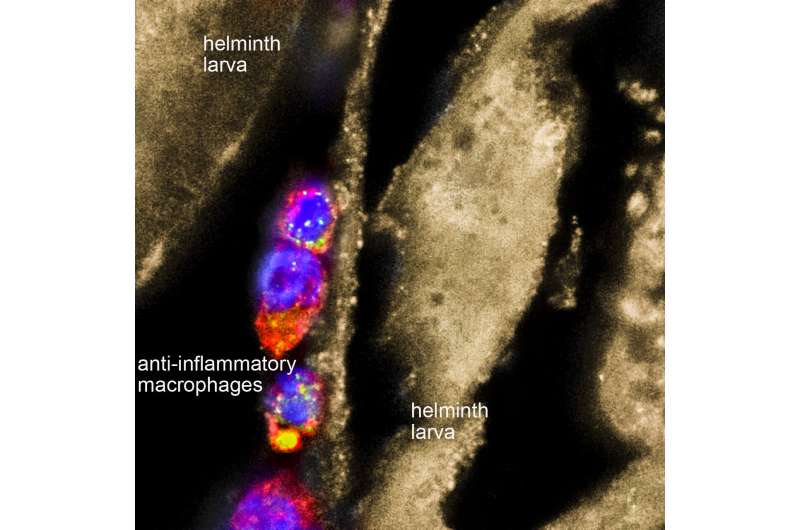April 23, 2020 report
Worm extract found to reduce inflammation in mouse models

A team of researchers from Germany, Switzerland, Sweden and Australia has found that a substance isolated from roundworm larvae was able to reduce inflammation in the airways of mice. In their paper published in the journal Science Translational Medicine, the group describes extracting a protein from a type of parasite that infects rodents and used it to make a nasal therapy for mice.
Prior research has shown that some materials produced by some parasitic worms (also known as helminths) can be used to reduce inflammation in some animals. Such work has shown promise for treating type 2 inflammation (a type that results in reduced lung function) in people with asthma and allergies—prior research has shown that approximately 50 to 70 percent of adult asthma patients have type 2 inflammation. In this new effort, the researchers focused their study on materials made by a type of roundworm larvae parasite that takes up residence in the intestines of rodents. Prior research has shown that they are able to turn inflammation responses by host rodents on and off depending on need.
The work involved collecting samples of Heligmosomoides polygyrus bakeri and removing extracts associated with reducing inflammation. They then mixed them into a nasal spray for use in mice with asthma-like lung inflammation due to exposure to dust mites. Doing so resulted in a strong reduction in inflammation. A closer look showed that treating the mice with the extract stimulated types of anti-inflammatory molecules called prostaglandin E2 and COX. It also showed that the extract behind the anti-inflammatory effect was glutamate dehydrogenase.
The researchers also applied their larval extract to human immune cells in a petri dish and found that doing so resulted in restrained inflammation—and it also set off triggers known as eicosanoids that serve as inflammation mediators. Other testing showed that the extract was effective in slowing granulocytes, which are involved in severe inflammatory episodes.
The researchers suggest that helminth-based treatments may provide an opportunity to develop more effective therapies for treatment of inflammation in patients with asthma or severe allergies.
More information: Marta de los Reyes Jiménez et al. An anti-inflammatory eicosanoid switch mediates the suppression of type-2 inflammation by helminth larval products, Science Translational Medicine (2020). DOI: 10.1126/scitranslmed.aay0605
© 2020 Science X Network


















